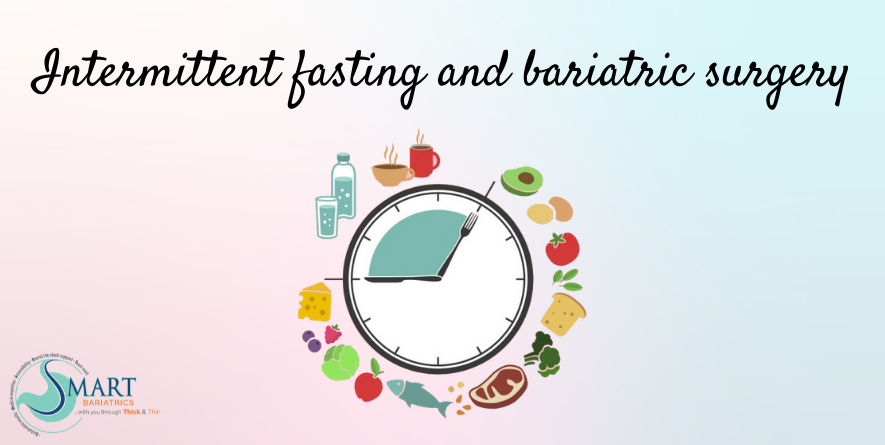
Why Intermittent Fasting Isn’t Recommended for Bariatric Surgery Patients
Intermittent fasting (IF) has quickly become one of the world’s most popular approaches for weight loss. A few of my bariatric surgery patients sometimes ask “may I go for intermittent fasting?? And my answer is a ‘NO’, not at all!!
Intermittent Fasting’s theory appears to be troublesome, so it’s important for us to take a closer look at the research and understand the positive and negative factors of this fad diet including whether it should be recommended to weight loss surgery patients or not.
Understanding Bariatric Surgery vs. Intermittent Fasting
Let’s first understand the weight loss concept behind both modalities; bariatric surgery as well as intermittent fasting.
Bariatric surgery helps you lose excess body weight by providing an element of restriction and/or malabsorption of the food. Also, the improvement in certain hormones induced by surgery controls your appetite, improves satiety, and helps resolve several obesity-related medical issues such as diabetes, high blood pressure, high cholesterol, obstructive sleep apnoea, infertility, PCOD, etc., whereas intermittent fasting focuses only on when you are eating, rather on what you are eating?
Popular Methods of Intermittent Fasting
There are a number of ways to follow Intermittent Fasting, all of which comprises of dividing the day or week into eating and fasting phases. During the fasting phase, you either eat very less or nothing at all. The three most popular approaches to fasting are the “16/8 method”, “Eat-Stop-Eat method” and “the 5:2 diet method”.
“16/8 method” involves skipping breakfast and limiting your daily eating period to 8 hours, such as 12 pm-8pm. You fast for 16 hours in between. “Eat-Stop-Eat method” comprises of fasting for 24 hours, one or two days a week, and the “5:2 diet method” includes only 500-600 Kcal consumption on two non-consecutive days of the week, eating normally the other 5 days. This fasting works by extending the period during which your body has utilised the calories consumed at the last meal and has switched to burning stored body fat. Once you exhaust your sugar stores for energy, your body starts utilising fat, called as metabolic switching.
Why Intermittent Fasting Isn’t Recommended After Bariatric Surgery
On the other hand, after bariatric surgery you eat less, that’s why you are advised to eat small and frequent protein-rich meals, to help you stay hydrated and well-nourished. The long-term goal for a healthy life after bariatric surgery is to practice a life-long diet and lifestyle changes to sustain weight loss and health-related outcomes. As you can eat less, it’s not a good idea to practice any fad diets including intermittent fasting after undergoing this surgery as prolonged fasting may cause you suffer dehydration, poor nutritional intake, and even nausea, and/or vomiting. Even the positive results of bariatric surgery could be compromised by following intermittent fasting. That’s why Intermittent Fasting is not a recommended practice for weight loss surgery patients.
Conclusion
After bariatric surgery, it is vital to nourish your body with the right amounts of protein, vitamins, minerals, and liquids. It is of the utmost importance for bariatric patients to eat ‘’healthy, quantity-controlled, protein-rich meals in a regularly scheduled manner throughout the day”.
Certainly, Intermittent Fasting isn’t for everyone!! It is important for people who want to lose weight to consult with a doctor and dietician, explore all the methods, and then decide what’s going to work best for you. Remember any approach you follow should have a scientific base and evidence-based guidelines, please do not follow any approach blindly!!
Love..
Dr. Beena Arora





